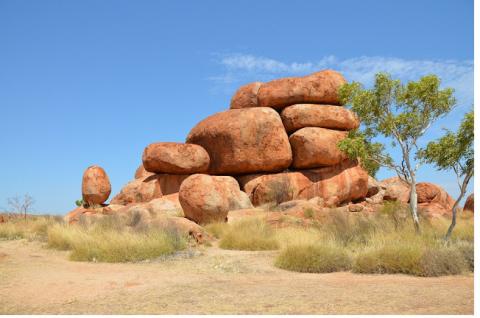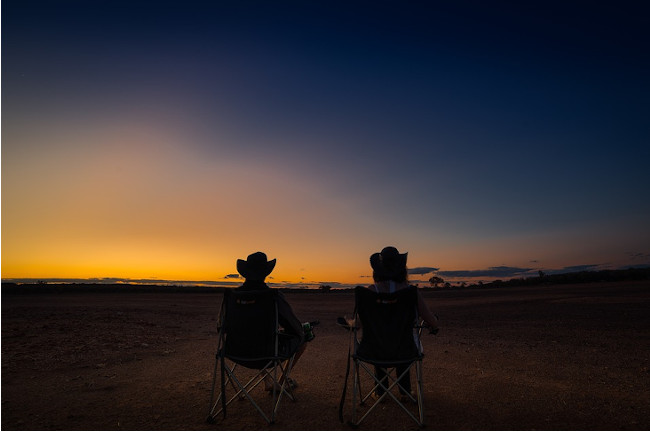‘The Sun Walks Down’ Is a Poignant Story Set Against the Landscape of the Australian Backcountry

The Sun Walks Down
by Fiona McFarlane
Farrar Straus Giroux
352 pages
The missing-child motif has become frighteningly pervasive in commercial novels and film. When the same plot line appears in a work of literary fiction, like Jon McGregor’s Reservoir 13, the results can be deeply haunting and powerful.
The Sun Walks Down, a new novel by the Australian writer Fiona McFarlane, falls squarely within this elite niche. It’s an outstanding achievement and should find a place among the best works of fiction in 2023.
In 1883, a child goes missing during a sandstorm in the barren landscape of southern Australia. This event sets in motion a range of actions and consequences in and around the small community of Fairly. The teeming cast includes (but isn’t limited to) Denny Wallace, the 6-year-old missing child; his mother, father, and five sisters; a priest undergoing a crisis of faith; two native trackers; a newlywed constable and his wife; and a Swedish exile painter and his wife.

Yet another character is omnipresent throughout—the vast, nearly uninhabitable Australian backcountry and its eternal companion, the burning sun (“the sky again turned an apocalyptic red”).
Understandably, at first, a reader might shy away from this seeming deluge of characters. But McFarlane quickly sharpens her portraits of people looking for Denny Wallace. Three country men are “shortish, squarish, with high surprised foreheads,” while the constable has a “whole wide permanent face, each freckle as dependable as a brick.”
Everyone involved in the search comes with their own distinct needs and concerns—not all of which have much to do with the missing boy.
Inevitably, some characters have more life than others. Cissy, the boy’s strong-willed 15-year-old sister, strongly resembles Mattie Ross, the spiky narrator of True Grit. Sergeant Foster, a veteran lawman and occasional author, stands out too. Here Sgt. Foster is viewed through the eyes of Joanna, the town’s matriarch:

“Foster, more malleable than expected, produces those active, anticipatory noises men make before they stand to leave a room … She remembers that his book includes a chapter on the heroic women of the bush, who sigh with loneliness in the melancholy twilight, as if the sun is always setting and the trees are always dense and straight and in a violet haze. He surveys the room as if he’s just entered it, he makes a chivalric gesture of farewell, and finally he leaves.”
The Sun Walks Down takes place over the course of a week. With each passing day, the search for Denny Wallace grows more agonizing, both for the community and the reader. McFarlane moves seamlessly between viewpoints, offering a close look at the local citizens’ passions and misgivings.
She also sympathetically portrays the native trackers, Billy Rough and Jimmy Possum, as they try to placate the white townspeople—all while maintaining their dignity, regardless of the callous treatment they often experience. At a difficult moment during the search, Billy reflects upon the course of events:

“Billy wonders if the rest of his life will be spent crossing back and forth across the plain, which he has heard described as an empty wasteland but Billy knows to be dense with motion: the motion of ancestors, spirits, the animals that should be here and the animals that shouldn’t, songs, stories, people, goods, water, minerals, the railways, the roads, stock tracks, fire and the celestial bodies. When he crosses the plain, he both lives inside this density and passes over it.”
There are many places where the author could have tripped up in this ambitious novel (her second, after The Night Guest)—losing the thread among a panoply of characters, failing to describe the Australian bush in fresh, interesting ways, or sacrificing momentum over the space of 350 pages.
Fiona McFarlane nimbly sidesteps these obstacles. The result is a rich, all-encompassing story that solidifies her status as a writer to be recognized and followed for years to come.
Author Bio:
The Confessions of Gabriel Ash, a new novel by Lee Polevoi, Highbrow Magazine’s chief book critic, is forthcoming from Running Wild Press.
For Highbrow Magazine
Image Sources:
Pen Ash (Pixabay, Creative Commons)
Moremilu (Pixabay, Creative Commons)
Farrar, Straus and Giroux
Rahim Mngwaya (Wikimedia.org, Creative Commons)































































































































































































































































































































